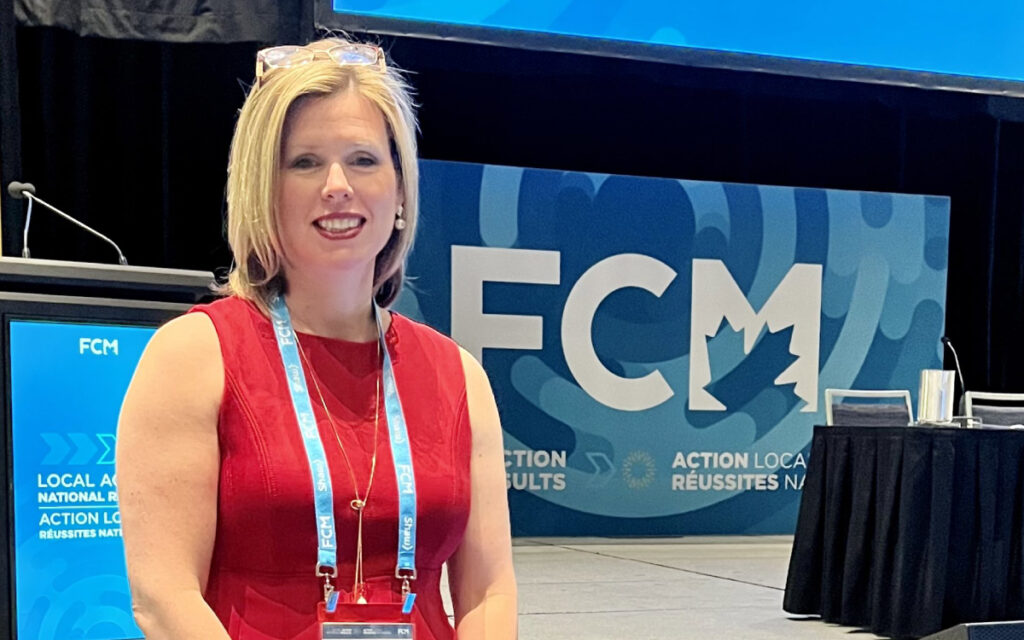
After significant debate, Councillor Diana Huson’s motion was narrowly defeated in a 14 to 12 vote. Pictured: Regional Councillor Diana Huson. Photo Credit: Diana Huson/X.
Niagara Regional Council is narrowly divided over whether to publicly side with the Ontario Energy Board (OEB) and against the Ford government over a disagreement about whether subsidies for natural gas pipeline construction for new housing developments should be scrapped.
The OEB is Ontario’s independent energy regulator.
The OEB recently announced plans to end subsidies for developers that currently help developers pay for the construction of natural gas pipelines for new housing developments.
The OEB rationalized its plans, claiming ending the subsidies would force developers to choose more energy-efficient heating options for new homes, including methods like heat pumps.
However, the Ford government has come out against the move, claiming doing so would increase the cost of building new housing.
Driving up the cost of housing runs directly counter to the province’s plans to stimulate supply to bring down prices.
The Ford government plans to pass legislation to reverse the OEB’s decision and maintain the subsidies.
Energy Minister Todd Smith said he was reluctant to get involved but argued that not doing so would lead to a significant increase in housing costs.
Councillor Diana Huson introduced a motion last month to call on Niagara Regional Council to urge Smith and the Ford government not to reverse the OEB’s decision.
Huson’s motion would have instructed Chair Jim Bradley to write the Ford government and side with the OEB. It was seconded by Pelham Mayor and Regional Councillor Marvin Junkin.
The motion noted the Niagara Region declared a climate emergency in 2021 and that newer forms of energy can be both cheaper and improve environmental outcomes.
Huson said natural gas “must be phased out” to lower Ontario’s emissions and deal with climate change.
Huson sees the OEB’s plans to end natural gas pipeline construction subsidies as a means of forcing developers to better protect the environment and mitigate the impacts of climate change.
Still, it is an open question as to whether developers would seek to pursue alternative methods of home heating or simply pass the cost on to new homeowners. The Ford government worries the latter would occur.
Huson recognized that the issue might be outside of Regional Council’s mandate but noted that the Ford government is currently accepting comments from the public. She claims Ontario will fall behind if the province doesn’t move with the times.
Junkin echoed Huson’s comments, and said that in order for the free market to determine whether natural gas or alternative energy sources should be used to heat new homes, there needs to be a fair playing field. As of right now, Junkin argued the subsidy for natural gas pipeline construction tips the scales in favour of natural gas.
Some councillors were sympathetic but refused to support Huson’s motion.
Fort Erie Mayor Wayne Redekop said a staff report would have made more sense before having a vote, while Niagara-on-the-Lake Lord Mayor Gary Zalepa suggested the subsidy should be gradually phased out.
Other councillors agreed with Zalepa’s call for a transition period.
Zalepa also expressed optimism that the province and the OEB might come to some other interim solution that wouldn’t entirely reverse the OEB’s move.
Rather than eliminating the natural gas subsidy, Councillor Leanna Villella suggested the government might consider extending subsidies beyond just natural gas to include alternative forms of energy.
Villella also refused to support Huson’s motion.
After significant debate, Huson’s motion was narrowly defeated in a 14 to 12 vote.

Jay Goldberg is the Ontario Director at the Canadian Taxpayers Federation. He previously served as a policy fellow at the Munk School of Public Policy and Global Affairs. Jay holds a Ph.D. in Political Science from the University of Toronto.




















